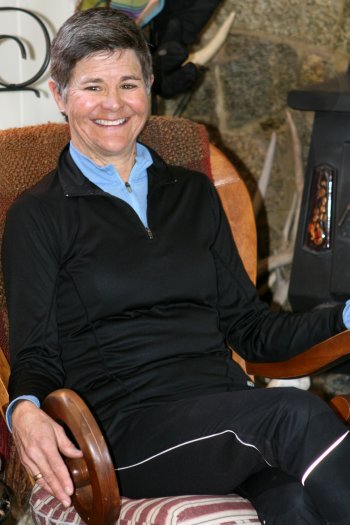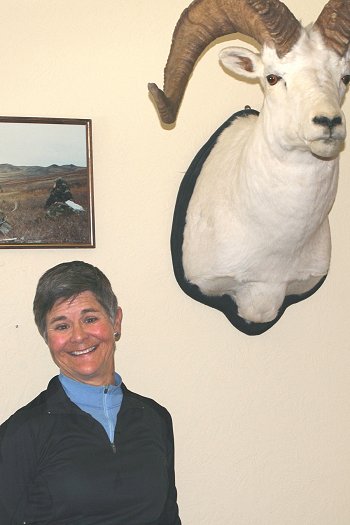home | internet service | web design | business directory | bulletin board | advertise | events calendar | contact | weather | cams

|
Pioneering attorney:  Winthrop Attorney Terry Karro. - Photo by
Solveig Torvik Winthrop Attorney Terry Karro. - Photo by
Solveig TorvikLong time local attorney Terry Karro arrived in the Methow Valley in 1972, just as the North Cascades Highway opened. Born in Helena, Montana, she arrived from Colorado to help her parents, who had bought a ranch in Mazama. Karro came armed with university degrees in math and Welsh literature from the University of Hartford and University College of North Wales, as well as a husband, whom she later divorced. “The first one didn’t take,” she says of that marriage. By the time she arrived here, Karro, now 61, had been a cocktail waitress in Maine, a plumber’s helper and lone armed security guard on the graveyard shift near Boulder, Colorado, at an apartment construction site that arsonists were trying to burn down. “I had to sue to get that one,” she says of the job. The firm refused to hire her because she was a woman, she explains, so she resorted to legal action under the 1972 Equal Opportunities Employment Act to get on the payroll. The company had to pay back wages for the period during which it had refused to hire her. She used the money to start law school. “I was a feminist early on. I was mad,” smiles Karro, whose maternal grandmother was a suffragette. Though slightly-built, Karro was perhaps more suited to security guard duties than might have been apparent at first glance. Of Finnish Sami ancestry, her father Bill, who had spent his career working for IBM, was a dedicated outdoorsman who inspired his family to love all facets of nature. He taught Karro to hunt. Evidence of her marksmanship is displayed on a wall in her Winthrop home: a large stuffed Dall sheep she felled with one shot in Alaska’s Wrangell Mountains. It tumbled so far to its death that it took two days to retrieve it, Karro says. At a time when law schools were imposing quotas on how many women they would accept, she decided to become a lawyer. “I wanted to engage my brain. I like people,” Karro says. She attended Gonzaga University School of Law on an academic scholarship and graduated in 1978. She fondly credits the late Kay Wagner, the moving force behind Winthrop’s westernization, for the financial help that enabled her to become an attorney. Karro, who has a twin sister in Alaska and three brothers living in the Methow, joined the firm of Twisp attorney John L. Reeder - where she’d already been working for three years - and became the only practicing female lawyer in the valley. This entailed challenges that young women today find hard to fathom, Karro relates. People who didn’t realize that Terry was not a man’s name would come into the office for help, take one look at her, then politely flee. Women would say: “I don’t think my husband would want me to hire a woman.” Of course there also were people who treated her well despite her sex, she says. “Mack Lloyd was a wonderful man,” she recalls. He took her into the woods and taught her how to estimate timber values. But even her benefactor, Wagner, reflected the pervasive sexism of the times. “I was her lawyer. But she didn’t think women should be telling the news” on TV, Karro chuckles. Still, she says she had an easier time being accepted as a female lawyer in a small community where people knew who she was.  Terry Karro felled this Dall sheep with one shot on a hunting trip in Alaska. - Photo by Solveig Torvik Terry Karro felled this Dall sheep with one shot on a hunting trip in Alaska. - Photo by Solveig Torvik
“I was Bess and Bill Karro’s daughter,” she explains with evident pride. Her parents were Mazama’s first emergency medical technicians. Her mother, who used to joke that “’I put my children in the oven to calm them down before bed,’” was “an awesome woman. She was everybody’s mother,” Karro says. “I was very lucky in my parents.” In 1981 she married the valley’s only dentist, Bob Maves, who shared her passion for the outdoors and who came with two sons she helped raise. “I married my children,” she says. Maves was an orphan who had been taken under the wing of the storied Mazama backcountry packer Jack Wilson. “My husband could pack a horse like nobody you ever saw,” she says. Maves rode with Wilson when he was helping scope out highway routes over the North Cascades in the 1960s and helped Wilson build part of the Pacific Crest Trail. “They were very good to him,” she says of the Wilsons. “My husband and I started the Methow Valley Education Foundation in 1984. We wanted to give something back,” she explains. She estimates that 150 students have received college scholarships from the foundation. “He was my partner,” she says of Maves.” We had a great time.” He died of cancer in 1999, leaving Karro a widow at age 48. “It was very difficult,” she says simply. She herself suffered a bout with cancer in her 30s but recovered to pursue an enthusiastic outdoor lifestyle despite an unrelated degenerative bone condition. Metal fuses her lower spine. “I can’t run anymore. I can’t lift. Sitting hurts like hell.” Still, she adds, “I am very lucky. I can still ride and hike and ski.” And, she adds brightly, “This is the time of the year when you can ski in the morning and ride your bike in the afternoon.” “I’m not supposed to go downhill,” she allows. However, this injunction is difficult to obey when you’ve been hiking uphill. “I was told not to backpack, so now I go lighter.” She hikes alone in the mountains on five or six day-long outings several times during the summer. “I do a lot of day hikes alone.” “I just have to be outdoors,” she explains matter-of-factly. “I get scared sometimes,” she admits, but adds that she feels safer in the woods than in the city. She likes to hike off trail. “I’m more afraid of getting lost out there than anything. I have a terrible sense of direction.” Karro, now retired, has been on the board of Farmers State Bank for 20 years and serves as its current president; she also serves on the board of Aero Methow Rescue Service and on Winthrop’s Civil Service Commission. She’s been the city attorney for both Winthrop and Twisp and was appointed in 1985 by Gov. Booth Gardner to serve a six-year term on the Washington State Fish and Wildlife Commission. But she wasn’t re-appointed by Gov. Mike Lowry. “I opposed his takeover of the wildlife department. We wanted to keep it non-political,” she says, but Lowry wanted the director to be appointed by the governor’s office. Like most people who have been here long enough to remember when things were different, Karro views the changes in the valley with mixed emotions. She longs for the day when she could ride a horse across fence-free hills without being shouted at to get off someone’s property. She disdains the “creeping crud” of homes going up along the valleys hillsides. But she also sees the positives. “In the early days you could be a cowboy or a cowboy. The new people have added a diversity we sorely needed. In the 1970s, it was getting old” in the valley demographically, she notes. Today, “there are some amazingly wonderful young people” living here. “You don’t end up in the Methow Valley by default,” adds Karro, who says people come - or stay - because they want to be here, despite the changes. “If life quits changing, check your pulse.” 04/02/12
Comments What a splendid article about Terry. My dad was also "mentored" by John Reeder when first arriving as an attorney in the 70s~he and others had loads of respect for her as a lawyer. Though the creeping crud has grown along with positive diversity since those magically free MV days, the values remain strong. Thanks for all your great work Terry! Georgina Tobiska Twisp Great article. Terry is an inspiration to me and a wonderful friend. Kathe Fowler Winthrop Oh - Terry- you are wonderful! My how times have changed from the very early days of you leaving for law school and myself studying at the U of W. Thank you for all you do and have done for the Methow Valley. Thank you for being a great family friend. Your wonderful husband, Bob, lives on in our hearts. Cindy Button Cindy Button Twisp Our community has benefitted in so many ways from Terry's vision and energy. Great article. There's never a dull moment when Terry's in the mix! Sheila Coe Mazama I would like to correct that my parents, Bess and Bill Karro, were not the first EMTs in the valley, but were the first in Mazama. Terry Karro Winthrop
|